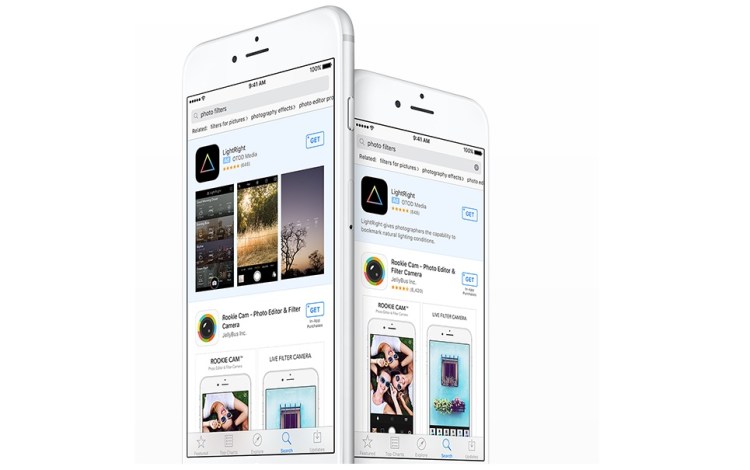Last week, Apple put the rumors to bed and confirmed that it will introduce paid search ads to the App Store, meaning app makers can pay to have ads for their apps appear at the top of search results. This could be detrimental to many of them. Apple’s App Store has more than 1.5 million apps, which means it’s already very difficult for the majority of apps to be discovered without investing significantly in advertising budgets. The introduction of the ads will just make it worse.
In its current state, the App Store is broken, from an app developer’s perspective. Apps are being lost in search results, users are struggling to find what they’re looking for, and ultimately, app makers are missing out on users and revenue. Apple has made small steps in recent years to improve discovery, such as the introduction of auto complete and trending search. However, Apple’s changes still don’t fix the problem – here’s why.
The chosen ad will be determined by a price auction, along with a metric determined by Apple.
This is a really controversial move by Apple at a time when App Store discoverability is in turmoil. With Apple previously ditching iAds in favor of ad free experiences, why has the company now decided to introduce search ads’?
The addition of search ads is a great example of Apple going against what it publicly preaches: better discoverability for more developers. As Eric Seufert (Partner at Heracles) said, “Search is basically the only way that a small developer without a big marketing budget can be discovered, why would they (Apple) want to take that away from them? If you open up search to being paid for, then you just give the big developers with the big budgets one more way to sort of monopolize discovery.”
It appears Apple has created another opportunity for a winner-take-all scenario. The move benefits big developers with big pockets who can outbid everybody else. Just like mobile advertising, it’s likely App Store inventory will be bought by the usual suspects such as Supercell and Machine Zone – apps everyone knows and sees continuously. App Store search should return the best and most relevant results, not those with the biggest marketing budget.
With that said, paid search could benefit some niche apps by improving their discoverability. For example, if a user searches general keywords like “taxi app,” a local taxi app that usually gets outranked by big brands like Uber and Lyft could increase its visibility in cities where those services don’t operate (providing the ads have location targeting, a capability Apple says it will offer). However, this is only possible if they have the budget to pay for such ads(!).
App Store optimization (ASO) is one of the few remaining organic methods for developers to generate awareness and installs for apps. It’s likely that the introduction of search ads will reduce the importance of ASO, making search optimization and the keyword field completely redundant – two elements that impact directly on discovery. Screenshot, icon, and description optimization, however, will remain valuable, if not more valuable than before.
Another exploding avenue of awareness and installs for developers has been influencer marketing. Upon launching an influencer marketing campaign, you could gain enough volume on a specific search query that you start trending on the App Store. This has given developers a nice organic uplift in installs. Apple claims that over 65% of apps are discovered via App Store search. However, this surge in searches is probably due to the emergence of influencers. You can’t provide links on social channels like Instagram and Snapchat, so users rely on App Store search to find the relevant apps. Influencer marketing generates hundreds of millions of downloads a year, so a high percentage of App Store searches are probably generated by influencer marketing. ASO and influencer marketing are two avenues we see as hugely effective when it comes to promoting apps, and Apple’s latest move suggests that these two avenues are seriously under threat.
There have been a lot of rumors recently surrounding Search Ads, and the general consensus was that they wouldn’t be developed further. So this announcement is a surprising revelation from Apple.
It is estimated that less than 2% of Apple’s revenue comes from the App Store. Still, the value the App Store creates for its hardware is immeasurable. If you were to take away the App Store, would Apple sell as many devices? Probably not.
So, if App Store content is of such importance to the success of Apple’s best-selling hardware, it seems like a bad move to put up another hurdle for developers who create the most innovative and original content.
Here are a few specifics to consider:
- What metrics will Apple use to ensure the paid results are relevant to the actual search?
- Will it look at the average page-view-to-download rate and benchmark the paid search results against organic? This would be logical, and would work similar to Google Search ads on desktop.
- Will Apple provide increased transparency on how the App Store search works? More transparency on how the search algorithm works could lead to advertisers having more confidence and spending more money.
- Will there be any benefit for smaller developers?
- And finally, in the games category, users usually know what they’re looking for. However, for other categories, will there now be a chance for developers to discover gaps in the market and build innovative solutions where brands aren’t competing?
Update on June 24: Apple says it’s doing several things to make sure the App Store search ads do help developers. For more detail, go here.
Ted Nash is CEO and cofounder of Tapdaq.


